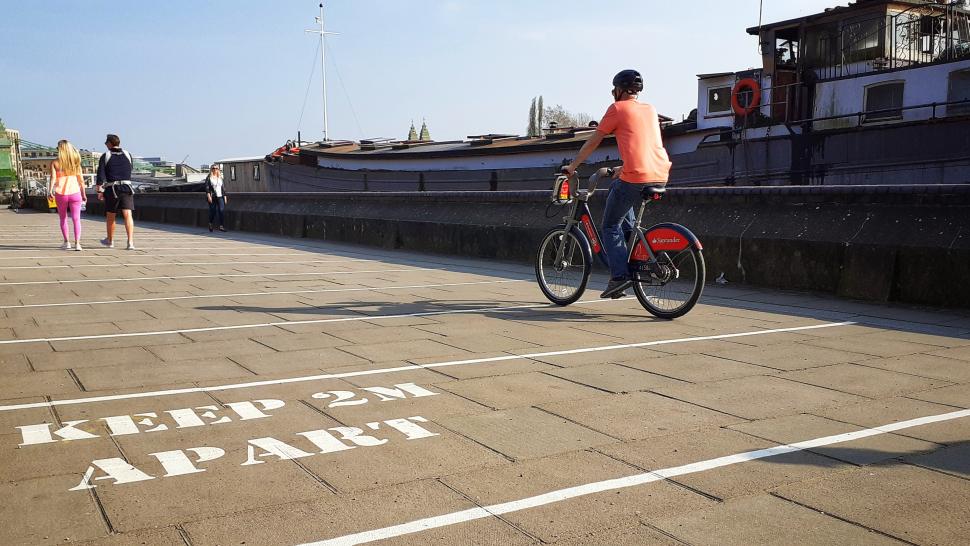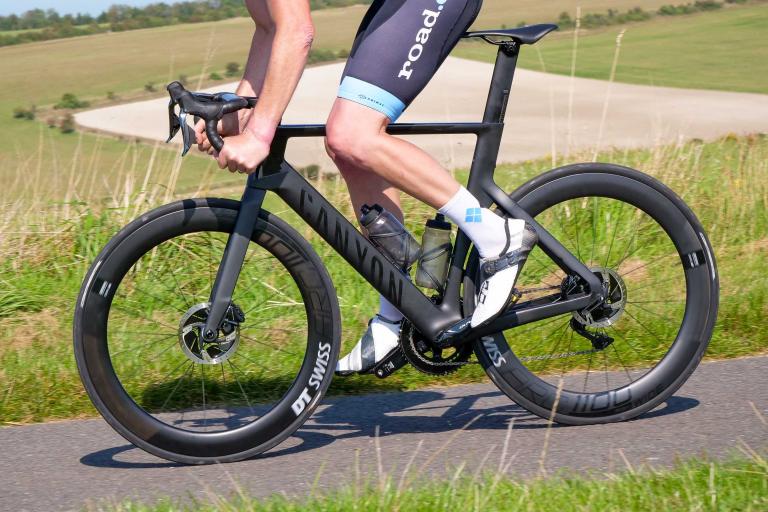- News
- Reviews
- Bikes
- Accessories
- Accessories - misc
- Computer mounts
- Bags
- Bar ends
- Bike bags & cases
- Bottle cages
- Bottles
- Cameras
- Car racks
- Child seats
- Computers
- Glasses
- GPS units
- Helmets
- Lights - front
- Lights - rear
- Lights - sets
- Locks
- Mirrors
- Mudguards
- Racks
- Pumps & CO2 inflators
- Puncture kits
- Reflectives
- Smart watches
- Stands and racks
- Trailers
- Clothing
- Components
- Bar tape & grips
- Bottom brackets
- Brake & gear cables
- Brake & STI levers
- Brake pads & spares
- Brakes
- Cassettes & freewheels
- Chains
- Chainsets & chainrings
- Derailleurs - front
- Derailleurs - rear
- Forks
- Gear levers & shifters
- Groupsets
- Handlebars & extensions
- Headsets
- Hubs
- Inner tubes
- Pedals
- Quick releases & skewers
- Saddles
- Seatposts
- Stems
- Wheels
- Tyres
- Health, fitness and nutrition
- Tools and workshop
- Miscellaneous
- Tubeless valves
- Buyers Guides
- Features
- Forum
- Recommends
- Podcast
news
What does Tier 4 mean? British Cycling updates Covid-19 guidance; Bikes on the pavement vs 4x4 crashing into a playground; Danny MaCaskill in Rhyl; Cyclist (wisely) stops at green light; More inconsiderate parking + more on the live blog
SUMMARY
 coronavirus - cyclists rides past social distance warning
coronavirus - cyclists rides past social distance warning22 December 2020, 17:14
"Those are the REAL problems": London transport policy officer not sold on 'dangers' of bikes on pavements compared to crashed 4x4s
Just your everyday road violence...a 4x4 just crashed into a kids playground in Hackney. But let’s keep arguing about parking and bikes on pavements yeh? Those are the REAL problems pic.twitter.com/wQuJon5XFG
— Will Bradley (@W_Bradley) December 22, 2020
Will Bradley, whose role involves the promotion of active travel to support London's Deputy Mayor for Transport and its Cycling and Walking commissioner, made the comments after posting a photo of a smashed 4x4 outside a school in Hackney. Plenty of others were quick to point out that the image serves as a reminder to tell us what the real dangers are on the roads.
We passed by that today. Absolutely shocking! What the hell kinda speed must they've been driving at!? Should never be allowed behind the wheel again.
— FB (@fraserb) December 22, 2020
We just came across it too. We were at the other end of BG. A car like that has no place on London’s roads let alone our playgrounds.
— Ben Addy (@BenjaminAddy) December 22, 2020
The comments seem particularly pertinent following our coverage of Lord Blencathra's comments on yesterday's live blog. The Conservative life peer suggested that cyclists who block the pavement should face up to six months in prison or fines of up to £5,000. His brainwave was swiftly rebuked by the DFT's Parliamentary Under Secretary of State Baroness Vere, who answered: "Her Majesty's Government have no current plans to consult on raising the penalties for cyclists and delivery drivers using heavyweight electric bicycles who ride on the pavement, or leave their bikes blocking the pavement."
22 December 2020, 16:58
Fake Chris Hoy news
Oops, I did it again https://t.co/UFywDDqNWU
— Chris Hoy (@chrishoy) December 22, 2020
Endorsed by Sir Chris himself.
22 December 2020, 14:55
What does Tier 4 mean? British Cycling updates Covid-19 guidance
Amongst other things, British Cycling has suspended all sanctioned activities in Tier 4 areas in England, with the exception of outdoor activities for under-18s and disabled people.
However, those living in Tier 4 areas can continue to cycle. They must either do this alone, with members of their household/bubble or with one person from outside their household/bubble.
We've updated our #Covid19 FAQs following the introduction of Tier 4 restrictions in England.
For more information on what this means for cycling events and activities, visit our website with the link below.
FAQs ➡ https://t.co/YwqN6mZ6SN pic.twitter.com/KnqNrWN7Zc
— British Cycling (@BritishCycling) December 22, 2020
22 December 2020, 15:31
22 December 2020, 14:12
Better signage needed on Cycleway 9?
It's clearly not an isolated example either ... https://t.co/9g65Jos0VO pic.twitter.com/HVUWfam9kU
— Simon MacMichael (@simonmacmichael) December 22, 2020
22 December 2020, 15:13
22 December 2020, 13:25
road.cc journo (and his dog) papped by London's Walking & Cycling Commissioner
That fella there - that's Simon MacMichael, that is.
Lovely to see the new Cycleway 9 in Chiswick being well used pic.twitter.com/68RgqyxRTl
— Will Norman (@willnorman) December 21, 2020
22 December 2020, 12:23

MPCC unhappy with cycling's progress on corticosteroids and ketones
The MPCC – the Movement for Credible Cycling – has criticised the UCI’s slow progress on banning corticosteroids.
Often used to treat asthma and allergies, corticosteroids may be used in competition in nasal spray form, subject to thresholds, while tablets and intra-muscular injections are banned in competition unless a therapeutic use exemption (TUE) has been obtained.
Substances falling under the heading include triamcinolone, which Sir Bradley Wiggins was able to use under TUEs ahead of key races including the 2012 Tour de France, which he won.
In March 2019, UCI president David Lappartient said he was ‘hopeful’ a ban on corticosteroids would be introduced from the start of the season just gone.
This did not happen and there is still no certainty it will be introduced.
A spokesperson for the MPCC – members of which pledge not to use corticosteroids – commented: “For thirteen years now, the members of the movement have been annoyed to see that they have been on their own when it comes to committing to strict and transparent rules on cortisol levels.
“WADA’s Executive Committee recently decided to prohibit any injectable form of glucocorticosteroids usage starting 1st January 2022. This is a real step ahead, praised by MPCC on its whole. The movement will nevertheless keep on carrying cortisol tests in 2021 during the wait.”
The group has also spoken out about the use of ketones.
The group said: “The concerns of the members of the MPCC Board about the misuse of corticosteroids are as strong as the concerns about the usage, in clear sight, of ketones. On this subject, we can only observe baby steps ahead.
“UCI, through the voice of its Medical Director, confirmed to our movement that it advised not to use ketones: this is a good start.”
Ketones are not part of the UCI list of prohibited substances and methods, but MPCC members have committed to not using them, arguing, “ketones can enhance performance but can also damage the health of the riders because of the potential side effects.”
22 December 2020, 11:01
Video: Danny MacAskill and Duncan Shaw take a trip the seaside
Feels like it's been a while since we had a Danny MacAskill video.
This latest one features a couple of other riders from his Drop and Roll live shows, which have obviously not been happening this year.
The video was shot over two days on Rhyl seafront.
22 December 2020, 10:55
A look at the new bike hub next to Kingston Station
Before recent restrictions, @RBKingston gave us a tour of the HUGE new bike storage hub nearing completion next to Kingston Station 🚆 It's been built as part of the Borough's #MiniHolland (or #GoCycle) programme funded by @TfL 🚲🅿️🚲🅿️🚲🅿️ pic.twitter.com/jmFrWoq2vA
— Kingston Cycling Campaign (@KingstonCycling) December 22, 2020
You also get a great view of the new cycle and pedestrian bridge being finished off which will improve walking and cycling from the station to the Thames (& towards Ham). Both hub & bridge are in their final stages and due to open by end of January 🌉🚲🌳 #GoCycle #MiniHolland pic.twitter.com/NLGvXvIeOp
— Kingston Cycling Campaign (@KingstonCycling) December 22, 2020
22 December 2020, 10:13
That van's back in the former Kensington High Street cycle lane again
If you don't know, the background to this is that the Royal Borough of Kensington and Chelsea removed a segregated cycle lane because it was supposedly causing congestion, but all that's really happened is that now people are parking there.
This van is such a frequent presence it now has its own Twitter account.
YES! pic.twitter.com/nc6bG2Mbym
— Is the van in the RBKC cycle lane still there? (@KensingtonVan) December 22, 2020
22 December 2020, 10:09
One pound in every five spent on bicycles between January and October was spent on e-bikes
22 December 2020, 09:49
Cyclist (very wisely) stops at green light
This cyclist riding along Burdett Road in London this morning defied all the clichés about cyclists running red lights by stopping at a green on.
Can't say we blame him.
Burdett Road at Mile End Road pic.twitter.com/0CuuNMrov1
— trafficgifs (@trafficgifs) December 22, 2020
Without wishing to excuse the drivers, could the phasing of this set of lights perhaps also be tweaked a touch?
22 December 2020, 09:17
Bit of a surprise development, this one
22 December 2020, 09:14
More inconsiderate parking
Bad parking was a theme on yesterday's live blog.
Here's a particularly impressive example.
Bunny hop?
3 miles from the ocean. I decided that someone just hit a really good wave. pic.twitter.com/qmYcUuda8T
— Phil Gaimon (@philgaimon) December 21, 2020
Alex has written for more cricket publications than the rest of the road.cc team combined. Despite the apparent evidence of this picture, he doesn't especially like cake.
Add new comment
17 comments



AlsoSomniloquism
|
4 years ago
7 likes
Re: Van in the Cycle lane.
On that picture and several others in the history of that account, Diplomatic Protection Vans are parked in that lane a lot. I wonder if they just congregate in a cafe there until one of the local Embassies deign they need protection / escorted travel. Of course as it is four wheels and not two, we don't get unrepentent drunk actors moaning.

Captain Badger
|
4 years ago
20 likes
Cyclist (very wisely) stops at green light
Thank gods the rider had their wits about them, cos the professionally trained LGV drivers certainly f*ckin' didn't... This is what I believe is what really happens in the majority of cases that "the cyclist was trying to undertake when they were tragically killed"

It seems like it's been sped up - the indicators on the lorries are flashing very fast, and the van accelerates at an unusual rate. It looks like the road is just about wide enough for both vehicles to turn into initially, but one of them would then have to concede the road once they reach the kerbed cycle lane a little way on.



It looks like there are two lanes and the van seeing 3 more lorrries all turning decided to enter the right one as the lorries would have been in the left. Silly driving there and another good reason that the cyclist stopped as if one of the lorries had allowed him through, the van probably would have taken him out.
Tipper wagons ! Close Convoy ! what could possibly go wrong ?
Though I do wonder if the footage has been doctored, one of the wagons seems to merge with the transit van turning right into the same junction just as the clip ends
Really interesting point - there does seem to be space for 2 vehicles in the funnel, as long as one gives way. I know what you mean about the video though on a second look.
Here is a view from Mile End. The red arrow shows the path of the tippers the blue shows the van. I think the van is masked by the tipper, but one will have to let the other go as they approach the bridge
But we digress, my original point still stands. Riders undertaking, my arse....


Cyclist (very wisely) stops at green light
Thank gods the rider had their wits about them, cos the professionally trained LGV drivers certainly f*ckin' didn't... This is what I believe is what really happens in the majority of cases that "the cyclist was trying to undertake when they were tragically killed"
Vast majority, I'd say. In fact I've seen cases where witnesses testified to this but the driver still got off because 'cyclists'
Cyclist (very wisely) stops at green light
Thank gods the rider had their wits about them, cos the professionally trained LGV drivers certainly f*ckin' didn't... This is what I believe is what really happens in the majority of cases that "the cyclist was trying to undertake when they were tragically killed"
Vast majority, I'd say. In fact I've seen cases where witnesses testified to this but the driver still got off because 'cyclists'
Agreed.

I'm not aware of the road rules in the U.K. but in Australia, heavy vehicles indicating to turn have right of way, with signs on the back stating that fact and can use more than one lane to execute the maneuvre; all vehicles going straight ahead, including cyclists in bike lanes, have to give way.
Note; in Australia, overtake means passing on either side of a vehicle travelling in the same direction.. the word undertake is not used.
https://www.nhvr.gov.au/files/202007-0849-vsb12-national-code-of-practic...
Latest Comments
- chrisonabike 11 min 10 sec ago
Luckily the Labour lot understand all the above, and aren't just pursuing "growth" because of the trickle down effect (a rising tide floats all...
- eburtthebike 18 min 9 sec ago
I wonder if it's the Dutch wind turbines that make the windmills turn?
- Miller 23 min 8 sec ago
Because the reframing work in post is a right pain in the neck, the reframed quality doesn't match normal action cams, because the cameras are...
- Simon E 28 min 56 sec ago
The whole basis of drivers v cyclists conveniently forgetting that the majority of cyclists also drive a car....
- staticV3 32 min 44 sec ago
Someone please explain to me. My Rockbros Q5 has:...
- David9694 1 hour 5 min ago
"This will kill tourism" fury as Devon price hikes confirmed...
- dubwise 1 hour 16 min ago
Didn't realise vehicles had eyes.
- David9694 1 hour 18 min ago
Car crashes into lamppost in Spring Road, Southampton https://www.dailyecho.co.uk/news/24909092.car-crashes-lamppost-spring-ro...
- David9694 1 hour 21 min ago
Spray.bike got me started on resprays. But I think "car" paint from Halfords gives a nicer finish and is no harder to use.



